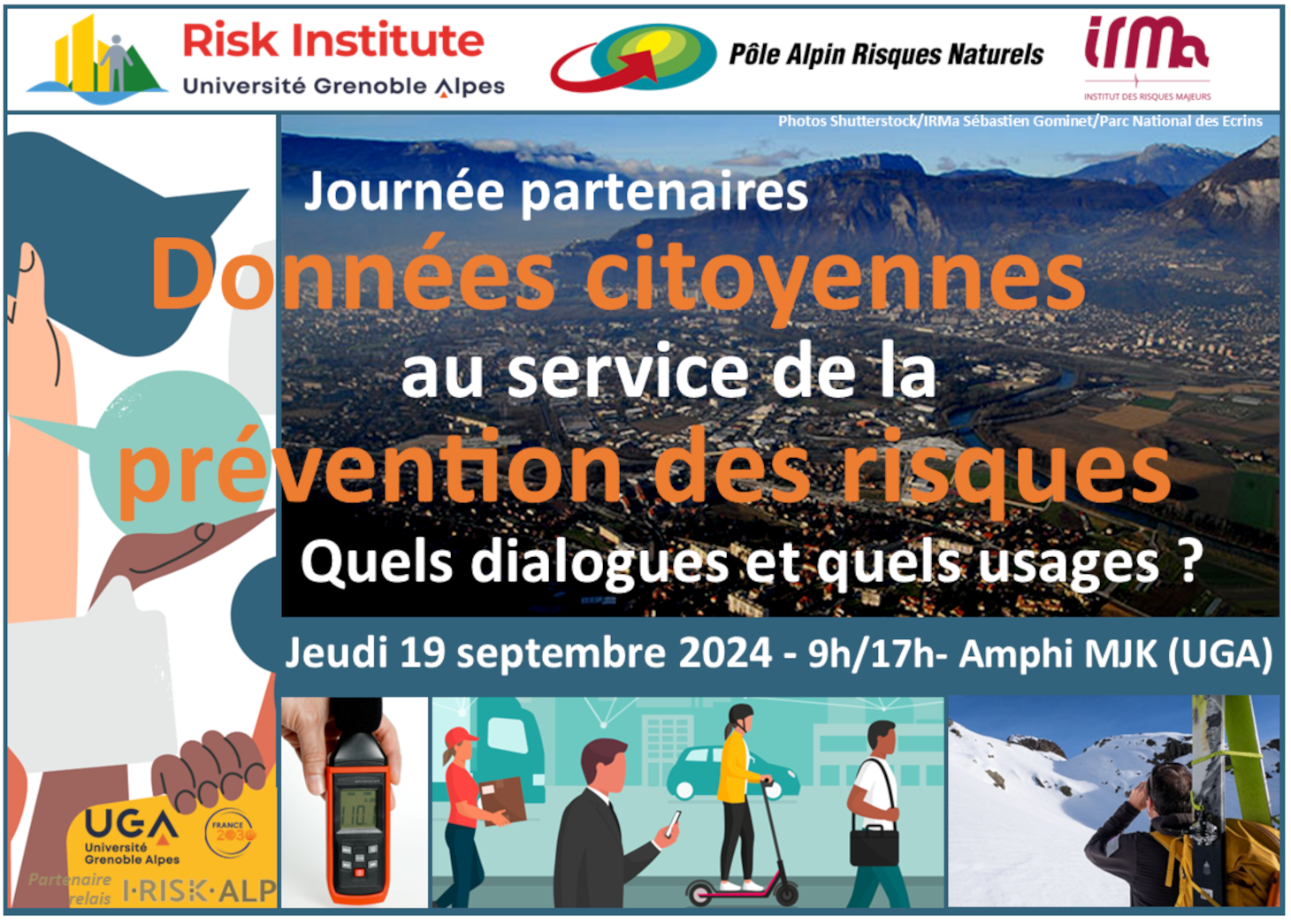- Share
- Share on Facebook
- Share on X
- Share on LinkedIn
Encounter/Debate / Event in French
On September 19, 2024

The Risk Institute, PARN and IRMA are organising their Partners' Day at the Maison du doctorat Jean Kuntzmann on Thursday 19 September 2024 from 9am to 5pm on the theme of citizen data for risk prevention. Following on from last year's theme on tools and systems for anticipating risks in the field, this year we will be looking at the issue from the angle of dialogue and the uses of citizen data between scientists, public authorities, economic players and citizens. This seminar in French is aimed at the scientific community and all the local players involved in risk prevention.
Registration
Participation is free and open to all upon registration.
Registration is closed. For late registration, please contact sylvie.perrier@univ-grenoble-alpes
How can we engage with these emerging players? How can we use the dynamics of participatory science upstream of crises and organise prevention? How can we set up crisis management systems that include citizens?
How can we manage conflicts of interest and responsibilities? How can citizens, experts and politicians use the data produced to support public authorities?
During the day, we will be presenting some existing initiatives for dialogue between scientists, managers and citizens, and we will be discussing the impact of these dynamics on risk management.
The aim will also be to identify the benefits of citizen participation for research and local authorities. In particular, we will be looking at the multi-disciplinary nature of these participatory science approaches (which can involve interaction between sociology, ergonomics, life and earth sciences, engineering, etc.) and the use of this citizen data in the public policy-making process.
Program
This programme is being consolidated and may be subjected to slight modifications in the coming weeks.
8.30am Welcome coffee
9.00am Opening
9.30am Que produisent les données citoyennes : nouveaux savoirs ? Nouvelles mobilisations ? Nouvelles gouvernance - Céline CHOLEZ (PACTE – UGA)
10.00am De la production de connaissances à la sensibilisation citoyenne : le cas des capteurs de la qualité de l'air en Auvergne Rhône-Alpes - Julie COZIC (ATMO - AURA)
10.30am Coffee break
11.00am Regards d’Altitude : Mobilisation d’un réseau de professionnels de la montagne pour l’observation des phénomènes naturels en montagne et co-conception d'un outil de collecte de données - Jean-Marc VENGEON et Matthieu LETOUZE (PARN), Sandrine CAROLY (PACTE – UGA)
11.30am Regard d'Altitude : Témoignages croisés d'acteurs du territoire et d'un scientifique sur l'intérêt de cette démarche d'observation partenariale - Xavier CAILHOL (Edytem-USMB / professionnel de la montagne)
12.00 Questions & answers
12.30 Lunch buffet
2.00pm Observatoire citoyen de surveillance sismique et aérienne de Beyrouth (Liban) - Cécile CORNOU (ISTerre - UGA)
2.45pm Risques industriels, pollutions et nuisances une place pour les données et les capteurs citoyens dans les procédures industrielles ? -
. Philippe CHAMARET (directeur de l'Institut Écocitoyen pour la connaissance des pollutions - Fos-sur-Mer)
. Réseau de "nez" à Feyzin (to be confirm)
3.30 Coffee break
4.00pm Table ronde : Comment les acteurs socio-économiques inscrivent le citoyen dans les démarches de prévention des risques et de gestion de crise ? Quelle responsabilité pour qui ?
. Marine D'ALBAREDE (Cheffe de projet innovation, numérique et data - Fabrique collaborative de services numériques d’intérêt général La Turbine.coop - Grenoble)
. Céline LUTOFF (Chercheuse vulnérabilité sociale et adaptation aux phénomènes naturels extrêmes - Institut Universitaire de Géographie Alpine - Grenoble)
. Marc SENANT (Responsable Savoir-faire et Méthodes - Institut pour une Culture de Sécurité Industrielle - Lyon)
. Corinne THIEVENT (Cheffe de cellule Culture du Risque Qualité de l'air - DREAL Auvergne- Rhône- Alpes - Grenoble)
5.00pm - Closure
Un événement organisé avec les équipes :
- RISK Institute - Université Grenoble Alpes
- Pôle Alpin Risk Naturels de Grenoble (PARN)
- Institut des Risques Majeurs de Grenoble (IRMa)
- Avec le relais de I-RISK
Date
Contact
RISK Institute : risk-institute@univ-grenoble-alpes - PARN : secretariat@risknat.org
Practical Information
- Amphithéâtre MJK - Campus
Maison du Doctorat Jean Kuntzmann
110 Rue de la Chimie, 38400 Saint-Martin-d'Hères - France
Accès depuis Grenoble:
Tramway B (direction Plaine des sports)
Station: Bibliothèques Universitaires
Consult the presentations from the 2023 Anticipating risks: technologies and new tools day
- Share
- Share on Facebook
- Share on X
- Share on LinkedIn